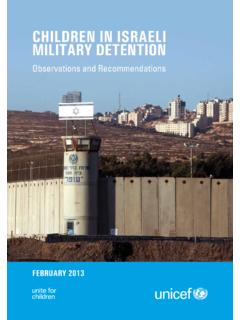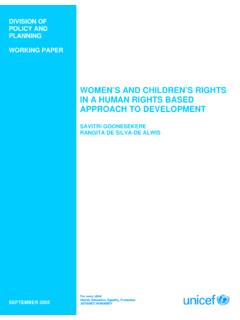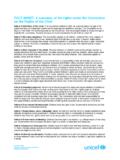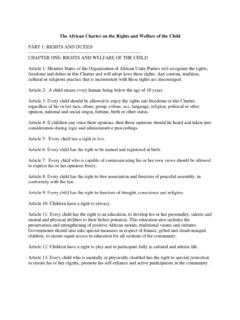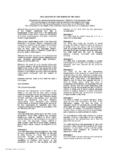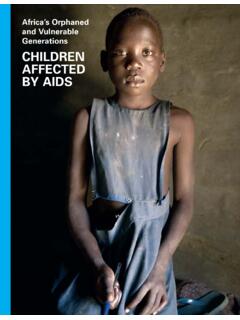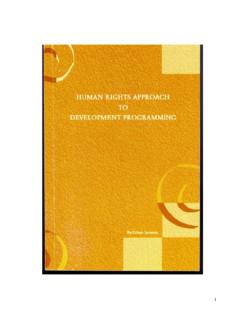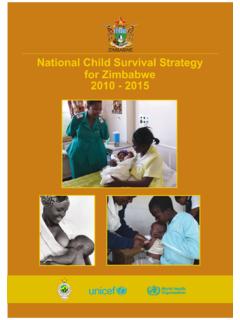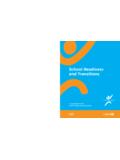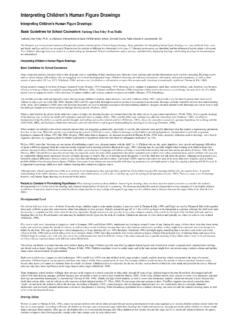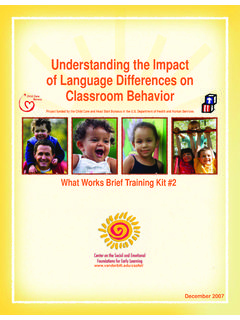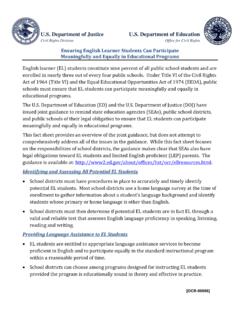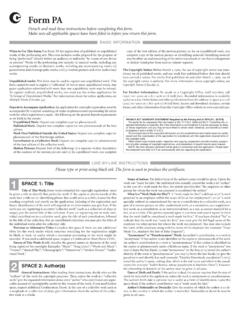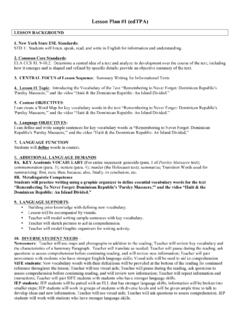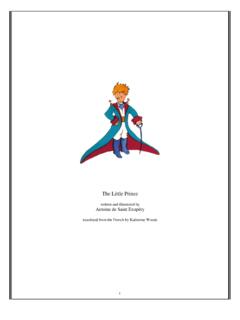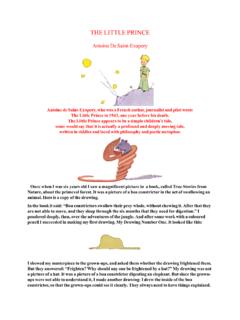Transcription of THE UNITED NATIONS - UNICEF
1 THE UNITED NATIONS CONVENTION ON THE RIGHTS OF THE CHILD THE CHILDREN S VERSIONThe UNITED NATIONS Convention on the Rights of the Child is an important agreement by countries who have promised to protect children s Convention on the Rights of the Child explains who children are, all their rights, and the responsibilities of governments. All the rights are connected, they are all equally important and they cannot be taken away from rights connectThis text is supported by the Committee on the Rights of the child is any person under the age of children have all these rights, no matter who they are, where they live, what language they speak, what their religion is, what they think, what they look like, if they are a boy or girl, if they have a disability, if they are rich or poor, and no matter who their parents or families are or what their parents or families believe or do.
2 No child should be treated unfairly for any must do all they can to make sure that every child in their countries can enjoy all the rights in this should let families and communities guide their children so that, as they grow up, they learn to use their rights in the best way. The more children grow, the less guidance they will must be registered when they are born and given a name which is officially recognized by the government. Children must have a nationality (belong to a country). Whenever possible, children should know their parents and be looked after by should not be separated from their parents unless they are not being properly looked after for example, if a parent hurts or does not take care of a child.
3 Children whose parents don t live together should stay in contact with both parents unless this might harm the child. Children have the right to their own identity an official record of who they are which includes their name, nationality and family relations. No one should take this away from them, but if this happens, governments must help children to quickly get their identity a child lives in a different country than their parents, governments must let the child and parents travel so that they can stay in contact and be can choose their own thoughts, opinions and religion, but this should not stop other people from enjoying their rights.
4 Parents can guide children so that as they grow up, they learn to properly use this must protect children from violence, abuse and being neglected by anyone who looks after have the right to get information from the Internet, radio, television, newspapers, books and other sources. Adults should make sure the information they are getting is not harmful. Governments should encourage the media to share information from lots of different sources, in languages that all children can understand. Every child who cannot be looked after by their own family has the right to be looked after properly by people who respect the child s religion, culture, language and other aspects of their are the main people responsible for bringing up a child.
5 When the child does not have any parents, another adult will have this responsibility and they are called a guardian . Parents and guardians should always consider what is best for that child. Governments should help them. Where a child has both parents, both of them should be responsible for bringing up the can join or set up groups or organisations, and they can meet with others, as long as this does not harm other child has the right to privacy. The law must protect children s privacy, family, home, communications and reputation (or good name) from any must stop children being taken out of the country when this is against the law for example, being kidnapped by someone or held abroad by a parent when the other parent does not child has the right to be alive.
6 Governments must make sure that children survive and develop in the best possible adults make decisions, they should think about how their decisions will affect children. All adults should do what is best for children. Governments should make sure children are protected and looked after by their parents, or by other people when this is needed. Governments should make sure that people and places responsible for looking after children are doing a good job. Children have the right to give their opinions freely on issues that affect them. Adults should listen and take children have the right to share freely with others what they learn, think and feel, by talking, drawing, writing or in any other way unless it harms other children are adopted, the most important thing is to do what is best for them.
7 If a child cannot be properly looked after in their own country for example by living with another family then they might be adopted in another should provide money or other support to help children from poor have the right to food, clothing and a safe place to live so they can develop in the best possible way. The government should help families and children who cannot afford child has the right to an education. Primary education should be free. Secondary and higher education should be available to every child. Children should be encouraged to go to school to the highest level possible.
8 Discipline in schools should respect children s rights and never use have the right to use their own language, culture and religion - even if these are not shared by most people in the country where they must protect children from taking, making, carrying or selling harmful government should protect children from sexual exploitation (being taken advantage of) and sexual abuse, including by people forcing children to have sex for money, or making sexual pictures or films of them. Governments must make sure that children are not kidnapped or sold, or taken to other countries or places to be exploited (taken advantage of).
9 Children have the right to be protected during war. No child under 15 can join the army or take part in war. Children have the right to be protected from all other kinds of exploitation (being taken advantage of), even if these are not specifically mentioned in this have the right to get help if they have been hurt, neglected, treated badly or affected by war, so they can get back their health and accused of breaking the law have the right to legal help and fair treatment. There should be lots of solutions to help these children become good members of their communities.
10 Prison should only be the last the laws of a country protect children s rights better than this Convention, then those laws should be articles explain how governments, the UNITED NATIONS including the Committee on the Rights of the Child and UNICEF - and other organisations work to make sure all children enjoy all their should actively tell children and adults about this Convention so that everyone knows about children s rights. Children who are accused of breaking the law should not be killed, tortured, treated cruelly, put in prison forever, or put in prison with adults.
